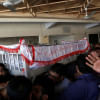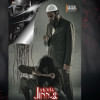Abdul Aziz ... going strong with villainous roles

Going back to his early days, Aziz a former Deputy Regional Director of Radio Bangladesh added, "The troupe that had been rehearsing a folk fantasy or a historic play throughout the rainy season was now well prepared to give a brilliant performance. With hassocks hung in every corner, actors dressed in rich velvety jackets and shiny armors, and women dressed as queens and princesses would transport the audience to a world of fantasy with their nightlong performances. Streams of people would come, abandoning their work to watch the open air theatre."
"As a boy of hardly 10, I frequently slipped into the jatra pandal during an unguarded moment of the sentry. It was difficult to manage even three annas as gate fee from the elders, so, the next best alternative was to cuddle under an elderly person's arm and slip through the gate and sit as close to the open stage. For three annas one was offered a seat on the floor, for six the wooden benches and for nine annas he was offered chairs (which were, however, very limited in number)," went on Aziz about an exciting past.
"The chill in the air brought shivers up the spine as the orchestra burst out with the percussion, drums, cymbals, bells, flute, clarinets, harmonium and trumpets and we made ourselves comfortable on the thin jute mats. We would gaze at the heroic stances and fiery dialogue of the emperor, trying to fight the conspirators who were often humans and even demons. These open air performances were our practical training grounds. Later, when we performed in our college days we were already a step ahead," said Aziz enthusiastically.
As a student, Aziz replicated the performances by creating a temporary stage. As he recalls, "A few households owning a Murphy radio set were then considered as high ups in society. The gramophone records were a great source of entertainment as well. We listened to the plays of Bikash Rai, Siraj-ud-Dowla's pala, Gunai Bibi'r pala and more."
When asked, why he chose to play a villain, Aziz has a ready reply: "Playing a hero is quite simple compared to enacting villainous characters. Imagine plays without villains. How unexciting and dull it would be. These characters throw a spotlight on social evils and are an eye opener. However, during my 40 years of involvement with the radio, I have mostly played a hero.
"It was eminent director, Mustafa Monwar who cast me as the coolie sardar in Tagore's play "Raktakarobi". The play was an immense hit and from then on I was mostly cast as a villainous character in TV plays."
Another memory that lingers on is of his enactment in 1996 of the eponymous role of Kabuliwalla in a TV play. Based on Tagore's short story, the role was first enacted by Chhobi Biswas in India some decades ago. Apparently a lot of groundwork went into Biswas' rendering of the central role--to the extent that he went to Kabul for six months to acquaint himself with the Afghan culture, mannerisms, attire and so on. On the contrary, Aziz only had one day's notice to play the part of the Kabuliwalla as the actor slotted for the role fell ill.
Aziz's role models are Golam Mustafa, Bikash Rai, Shombhu Mitra, Utpal Dutta and others. He is also appreciative of BTV, which, until recently, "produced brilliant TV plays and our traditional jatra." Others who have made brilliant contributions in this field, says Aziz, are producers Abdullah Al Mamun, Md Zakaria, Musa Ahmed, Abdullah Yousuf Imam, Zia Ansari, Atiqul Huque Chowdhury and Habib Ahsan.
Apparently the audience identifies him so closely with the roles he plays that there are times when passersby point to him as a shady character. Though this can be unsettling, at another level it is a compliment for Aziz. "This is a form of recognition from my audience," he says.

 For all latest news, follow The Daily Star's Google News channel.
For all latest news, follow The Daily Star's Google News channel. 








Comments